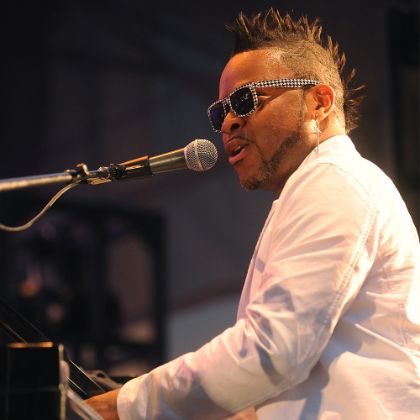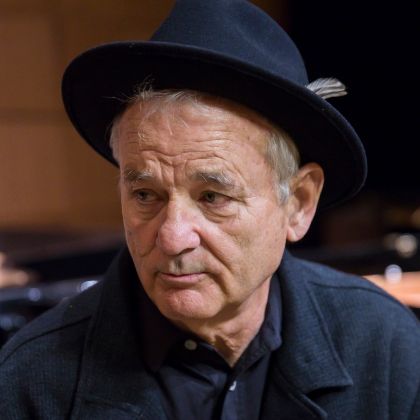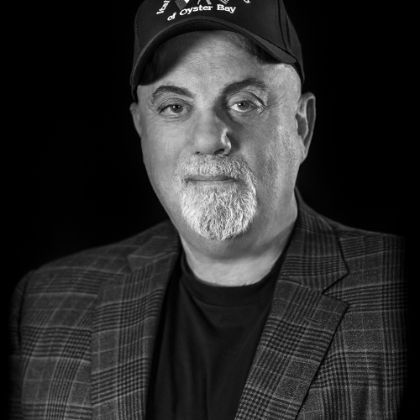Photo: Kirk Edwards
Listen Magazine FEATURE
Soaring Melodies
Olga Kern On The Rich, Pianistic Legacy Of Rachmaninoff, Chopin, Tchaikovsky, The Kern Family and Billy Joel.
By Ben Finane
IN 2001, OLGA KERN — a Steinway Artist — became the first woman in over thirty years to win the Van Cliburn International Piano Competition. Like Cliburn before her, the Russian-born pianist specializes in the Russian masters — namely, Rachmaninoff and Tchaikovsky. In 2012 she and her brother Vladimir founded the Kern Foundation's “Aspiration,” which seeks to provide financial and artistic assistance to musicians worldwide. Kern recently accepted an invitation to preside over the Van Cliburn Amateur Competition.
You Have Told Me Of Your Desire To Record All Of Rachmaninoff. Tell Me About Rachmaninoff As A Composer, Why You Feel So Drawn Toward Him?
Rachmaninoff is a special composer for all pianists, I think, because he was a great pianist himself. He knew piano so well that every work he composed for it was a masterpiece. It’s a joy to perform his music. Being Russian and being born into a musical family — my parents were both pianists — I’ve heard a lot of Rachmaninoff’s music since I was born and I feel like his music is important not just for me, but for every pianist. In my conversations with Van Cliburn, he always told me: ‘Olga, Rachmaninoff is always behind our shoulders. For pianists, this is how it is.’
What Does That Mean?
It feels like his spirit is with us. When you play his music, it’s so inspiring because you feel like he is there with you, to help you. It’s always been this way for me — Rachmaninoff’s music has always helped me through difficult situations. When I hear his Second Symphony or Third Symphony or Symphonic Dances, the music just hits me.
You Believe All Pianists Should Play Rachmaninoff. Why?
It’s perfectly written for piano. On a technical level, there is everything — all sorts of technique. And the technique is always in aid of his beautiful melodies. It’s not as though you’re working through difficulties to try to make this or that part of a technical passage sound right. No, it’s so easy and pianistic — even though it’s very hard — because he had such comfortable hands and he knew the piano so well.
As A Pianist-composer, Would You Say Rachmaninoff Is A Bit Of A Modern Liszt?
Of course — I think so. To this day he remains a very popular composer, even a pop composer! We know so many of his melodies, used for Hollywood movies, for….
Figure-skating Routines.
Exactly! When I performed once in Kazan, people remembered how Rachmaninoff himself had played in the same theater, accompanying my great-grandmother at that! So he is particularly close for me personally.
In Addition To This Family Connection, Do You Feel That, As A Russian, You Have A Special Connection To Rachmaninoff In Particular and To Russian Composers In General? Is There Something To That Notion That As A Russian You Can Play Rachmaninoff, Or As An American You Can Play Gershwin?
It’s interesting. I always wonder how it is that an American musician can play Russian music. It’s definitely possible; Van Cliburn, of course, won the first Tchaikovsky competition in Moscow and opened the eyes of the musical world at that time. He could play Rachmaninoff and Tchaikovsky’s music like nobody could before him, and it was in such a great Russian way. I say ‘Russian way’ because the Russians are always sad, even if they are happy.
So There’s A Specific, Russian Way Of Playing Nostalgic, Romantic Music?
Exactly! Cliburn captured that, and he didn’t play too fast. He played all the melodies in such a way that they were big. Soaring. It was beautiful; the piano was singing. This is why I can’t say that I play this music because I am Russian, but of course I feel it. My grandparents had a beautiful house outside of St. Petersburg — actually where Rachmaninoff was born — and I spent every summer with them and the nature that Rachmaninoff loved so much. Take one of his songs, ‘Lilacs’: I know those lilacs from the gardens in that area. When I visited Van Cliburn’s birthplace I couldn’t believe it was actually Texas because there was such beautiful nature there. And I thought, ‘So this is why he felt so Russian!’ This nature was so important for Russian composers, this big, grand nature with a lot of beautiful trees and endless fields. I think that was important for them because they loved that country so much. They were trying to capture the land, those landscapes, in their music, much like Russian painters of the time. But you just can’t say, ‘Oh, because I’m Russian I play this music this way.’ I simply feel it my way, and that is not necessarily even the Russian way, because I’ve studied all over the world and played master classes with all sorts of different teachers. You have to be like a sponge, taking things from different countries and cultures, for the possibility of finding new interpretations and new sounds in music that everyone knows, even Rachmaninoff’s.
Let’s Talk About Some Of That Music. As A Casual Listener, We May Only Be Familiar With The Piano Repertoire In This Order: Rachmaninoff’s Third Piano Concerto, Rachmaninoff’s Second Piano Concerto —
— Rhapsody on a Theme of Paganini, only one variation of course, Number 18.
Naturally — The Figure-skating Variation. And Perhaps The C-sharp Minor Prelude, A Beautiful Morsel That A Lot Of Piano Students Have To Play But Which Rachmaninoff Sought To Distance Himself From Since Writing It At An Early Age. But There Is So Much More!
There really is so much more! I don’t think one lifetime would be enough to learn all of his music. Both of his sonatas are incredible, and his Cello Sonata is some of the most beautiful music ever written for any instrument. There are such wonderful melodies in each movement and the way he puts the piano in is really amazing; it’s actually written for cello and piano, not just cello. It’s so rich! All of this piano music — and the cello’s beautiful timbre. In that piece, you can hear why Rachmaninoff loved cello: it just goes so perfectly with piano.
And there are his Moments musicaux, Op. 16; Morceaux de salon, Op. 10; Morceaux de fantaisie, Op. 3 — the only well-known piece from this is the Op. 3 No. 2, the C-sharp minor Prelude you mentioned, but everything else — his Barcarolle is just a great piece of music — and of course so many preludes people just don’t know. Especially in his late Opus 32 [13 Preludes] there are so many. And of course the Études-tableaux and his variations: Variations on a Theme of Corelli showcases his compositional genius; he transforms a simple Corelli theme in A minor into a fantastical D-flat Major variation.
‘You have to be like a sponge. Taking things from different countries and cultures, for the possibility of finding new interpretations and new sounds...’
Maybe The Simplicity Of That Melody Helped.
Yes, yes. It’s the same with Rhapsody on a Theme of Paganini — another simple A-minor melody — and the Variations on a Theme by Chopin. Rachmaninoff loved Chopin because he was another king of piano. For every pianist it is, it was, and it always will be important to play Chopin.
Rachmaninoff continued to work on his First Piano Concerto his whole life, creating different editions. The last version is just the most remarkable music. At one point in the second movement, the entire orchestra stops and the pianist plays solo for an entire page! It’s so beautiful that tears immediately come from your eyes. Not necessarily because it’s sad — like I said before, he’s Russian so of course he is sad — but, he’s happy. It’s a happy melody.
It Sounds A Lot Like How The Great Brahms Biographer Karl Geiringer Described The Music Of That Composer, Who Was Forty Years Rachmaninoff’s Senior: ‘smiling Through Tears.’
This is exactly how it is. And Rachmaninoff looked to past masters, too. He had great piano transcriptions of Mendelssohn’s work, because he loved Mendelssohn’s orchestration. And Tchaikovsky, of course, because Tchaikovsky was a master for all Russian composers. All of his transcriptions, in a way, remain so Rachmaninoff. And even in his recordings of music by other composers, we feel Rachmaninoff in every note: Chopin’s Second Sonata, Schumann’s Carnaval — it’s total Rachmaninoff!
Tell Me A Bit About Your Relationship To The Music Of Chopin, This Other ‘king Of Piano.’
Chopin’s approach to the instrument is very important as far as playing his music correctly. His music is so melodic and so musical, and to make the right sound, the ‘Chopin sound,’ requires a specific pedaling technique and a special touch.
What Is The ‘Chopin Sound?’
In my opinion it must be very sensitive but at the same time brilliant. I know a lot of people say that Chopin can be played with a strong fortissimo — and certainly we can hear in the Études, Op. 10, No. 12; his Polonaises; and even in his concerti that this music is dramatic, but it is also sensitive, not dramatic with huge power like Liszt. When can hear Chopin’s fragility, his feeling. Even when we play Chopin strongly, with fortissimo, it must always sing. This is Chopin’s musicality, to make the piano sing. It’s not easy, of course, because the piano is a percussive instrument with all these hammers inside and it takes a lot of professionalism to make the instrument sing.
That’s why the pedaling is so important to Chopin’s music and the Chopin sound, specifically the balance between the soft pedal and the sustain pedal. Too much soft pedal limits the coloration, while the sustain pedal prolongs the sound and allows it — if used correctly and naturally — to hang in the air.
In Contrast To Rachmaninoff’s Soaring Melodies, Chopin’s Are Lyrical, Quieter.
Yes! More sensitive. This is why all great pianists and composers — including Rachmaninoff — really learned and took so much from Chopin, whose lyrical nature is unique.
‘My son is the best thing that ever happened to me in my life. He changed me completely. Everything that happened after he was born — including winning the Van Cliburn — made sense.’
You Spoke Of Van Cliburn’s Facility For Big, Soaring Russian Melodies — Rachmaninoff Certainly, But Also Tchaikovsky.
If Mikhail Glinka was the father of Russian classical music, Tchaikovsky took Russian music to another level — through his use of Russian folk music within the different language of classical music. We don’t hear that Russian folk music nowadays, but it was a huge part of Russian culture at the time; everybody was singing those folk songs and grew up listening to them. With Van Cliburn playing Tchaikovsky, it feels like he knew that folk culture somehow. It’s important to know that there is a specific voice in Russian folk songs — as in American country music — a very specific tone, a special sound which is difficult to make.
I Am Thinking Of Stravinsky’s Les Noces, A Search For The Folk-peasant Roots Of Russian Music — and That Special, Straight Tone.
Exactly. It’s a strong voice, yet one which produces a soft, very warm… it sounds very Russian. [Laughs.] So of course this folk element was very important for Tchaikovsky, and it is what makes his music sound so Russian. But because he learned so much from Europeans and ultimately took so much from all over the world this lends his music a universal quality. We all know The Nutcracker, yet every time I hear the children’s choir from Nutcracker I feel my heart beating with such excitement.
Tchaikovsky seems to find so many new things in music, even in his First Piano Concerto: nobody did this before; nobody used all these big chords, so much technique, all the octaves and difficulties. When he showed it to Rubinstein, the pianist said ‘It’s impossible to play this piece, you must change it!’ And of course Tchaikovksy said, ‘I’ll never change anything!’ and he was completely right, because the way he wrote it, despite its technical difficulties, is ultimately quite comfortable for pianists to play. The way he used piano and orchestra together in a concerto is a totally different level of concerto composition, because before then it was a competition between the instrument and the orchestra. But Tchaikovsky really blended the piano with the orchestra.
And We Certainly Hear The Orchestral Nature Of Tchaikovsky’s Piano Concertos Echoed In Rachmaninoff’s.
Definitely. Rachmaninoff took that huge piano sound of Tchaikovsky’s First for his own Second Concerto, third movement. And of course Rachmaninoff’s Third uses those huge chords; they both knew how to compose in that big Russian sound.
Your Son Is Also A Pianist, and You Two Will Be Playing The Mozart Double Concerto.
My son is the best thing that ever happened to me in my life. He changed me completely. Everything that happened after he was born — including winning the Van Cliburn — made sense; I knew I had someone that I was doing it for. I love what I do, but it gives me even greater joy that he is a pianist, too. He is studying at Juilliard now. He is my inspiration.
As The Father Of A Two-year-old, I Know That A Child Puts An End To Your ‘down Time.’ So It Must Have Been Challenging For Your Career To Be A Single Mother.
I must say that Vladislav’s birth really helped me to understand what it is — this thing that we call “life” — to actually exist. His birth balanced my musical career and personal life: I know for what I am living. We do fun things together, like going to the Billy Joel concert —
Let Me Stop You Right There. I Was At That Concert, Too. Did You Enjoy It?
Oh my God, it was incredible! We just loved it. When we got there to the big Madison Square Garden, we were quite early because I don’t usually go to these kind of concerts and I didn’t know how long it would take for security, or that they start late. When we sat down, Tchaikovsky’s First Concerto was playing. And I recognized that it was Van Cliburn’s recording. Then on the big screen is Billy Joel talking about Cliburn winning the Tchaikovsky Competition and the Cold War and about how he [Billy Joel] always wanted to go to Russia and play for the Russian people. And he did a big tour [to the Soviet Union in 1988] and the Russian people loved him.
And during the concert, as I was listening to him live, I understood how much Joel had learned from classical music — his way of playing the instrument, his songs are so melodic: it’s popular classical, not really pop music, really a great way of approaching people’s hearts. And of course I know almost every song and they’re musical and the harmonies are so beautiful. I think he approaches the listener in this way because he knows classical music and he knows the piano repertoire specifically. The decision to have Van Cliburn playing Tchaikovsky before his own concert reveals a lot.
This article originally appeared in Listen: Life with Music & Culture, Steinway & Sons’ award-winning magazine.
related...
-

Soundboard — Davell Crawford
Davell Crawford discusses the rich jazz tradition of New Orleans, the fall of New York, moving forward, and employing the multiple personalities that live within you.
Read More -

Soundboard — Bill Murray
Bill Murray discusses American Letters, Mark Twain, James Thurber, absurdity vs. ridiculousness, failure, getting to work, writing vs. acting, rhythm and flow, and improvisation.
Read More
-

Same Hits, Different Day
Living legend Billy Joel talks about the staying power of his music, the alchemy and process of songwriting, the origins of his aesthetic, Beethoven and the Beatles, and what he’s trying to learn now.
By Ben Finane
Read More